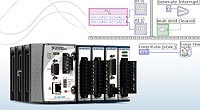National Instruments LabVIEW Goes Embedded with New CompactRIO Platform

National Instruments today announced CompactRIO, an ultra high-performance embedded control and acquisition platform powered by reconfigurable I/O (RIO) technology for advanced applications where small size and reliability are crucial. National Instruments RIO technology gives LabVIEW developers the ability to define their own custom measurement hardware circuitry using reconfigurable FPGA chips and LabVIEW graphical development tools. “Because of their performance and flexibility, FPGA chips have gained wide market adoption among digital design engineers. RIO technology delivers these benefits to a broader range of engineers and scientists by eliminating the steep learning curve traditionally required to program FPGAs,” said Tim Dehne, NI senior vice president of R&D. “Graphical programming of FPGAs extends virtual instrumentation by empowering LabVIEW users to synthesize their own custom measurement circuitry that rivals the performance and optimization of vendor-defined hardware.” There are two configurations for CompactRIO: an embedded system and an R Series expansion system. The new CompactRIO embedded system features a real-time embedded processor, four or eight-slot reconfigurable chassis containing a user-programmable FPGA and 10 hot swappable industrial I/O modules. Each I/O module includes built-in field wiring connectivity, signal conditioning, conversion circuitry and an optional isolation barrier. By integrating the connector junction box into the modules, CompactRIO significantly reduces the space requirements and cost of field wiring. This low-cost embedded architecture delivers open access to low-level hardware resources for rapid development of custom stand-alone or distributed control and acquisition systems. The CompactRIO R Series expansion system provides high-performance signal conditioning and industrial expansion I/O for PCI or PXI/CompactPCI R Series FPGA devices. Engineers can install an R Series FPGA device in any desktop or industrial computer running Windows or LabVIEW Real-Time operating systems. In this configuration, an R Series expansion chassis connects directly to one of the digital ports on the R Series FPGA device. The expansion system adds custom measurement capabilities to applications that include traditional plug-in data acquisition, vision, motion and modular instrument devices. By taking advantage of the extreme performance and small size of reconfigurable FPGA chips, CompactRIO delivers unprecedented control and acquisition capabilities in a compact, rugged form factor. A four-slot CompactRIO embedded system measures 7.07 in. by 3.47 in. by 3.47 in. and weighs just 3.47 lb. The DC-powered system typically consumes just 7 to 10 W of power and can withstand temperatures ranging from -40 to 158 degrees Fahrenheit and up to 50 g of shock. CompactRIO I/O modules feature up to 2,300 Vrms isolation (withstand) and 250 Vrms isolation (continuous). Each component comes with a variety of international safety, electromagnetic compatibility and environmental certifications and ratings. The RIO FPGA circuitry at the heart of the CompactRIO system is a parallel processing reconfigurable computing engine that executes embedded LabVIEW applications deterministically at rates up to 100 times faster than previously possible. With CompactRIO, engineers can implement multiloop analog PID control systems at loop rates exceeding 100 kS/s and digital control systems at loop rates up to 1 MS/s and evaluate multiple rungs of Boolean logic in less than 25 ns. CompactRIO is designed for advanced developers who will use LabVIEW graphical development tools to adapt the reconfigurable hardware for a wide variety of industries and applications. Early access customers such as MTS, Roush, Goepel, Process Automation and Virginia Tech have already successfully developed CompactRIO embedded systems for heavy machine control, in-vehicle data acquisition, acoustics and vibration analysis and electric motor drive characterization. “Using our existing powertrain control and LabVIEW expertise, we prototyped a full-authority engine control system with CompactRIO to control a high-performance motorcycle engine in just three man months. In past projects, it took us at least two man years to develop similar ECU systems with custom designed hardware,” said Carroll G. Dase, president of Drivven, Inc., an automotive control and data acquisition solutions provider. “With CompactRIO, we ran deterministic loops on the order of milliseconds and performed FPGA-based fuel and spark timing on the order of microseconds. In addition, we could easily add sensors and actuators, or otherwise modify our system, with minimal time investment.” The new NI CompactRIO product line includes cRIO-9002 and cRIO-9004 real-time controllers with industrial 200 MHz floating-point processors, the cRIO-910x family of four and eight-slot reconfigurable chassis featuring 1 million or 3 million gate FPGAs and a wide variety of I/O types, from ±80 mV thermocouple inputs to 250 VAC/VDC universal digital inputs. Engineers program CompactRIO hardware using LabVIEW, the LabVIEW Real-Time Module and the LabVIEW FPGA Module. For more information on CompactRIO and RIO technology, readers can visit www.ni.com/compactrio About National Instruments Pricing and Contact Information
|
















